Home › Forums and Archive › Tiller Girls 1940’s › Yvonne Sellers / Nee Woodroffe
- This topic has 0 replies, 1 voice, and was last updated 9 years, 1 month ago by
 Bernard Tiller.
Bernard Tiller.
-
AuthorPosts
-
March 11, 2015 at 6:11 pm #453
 Bernard TillerModerator
Bernard TillerModeratorOver the years I have been exchanging emails with Yvonne who has been telling me all about her time with the Tiller Girls in the 1940’s. Yvonne has given me so much information and wonderful photos. Yvonne now lives very happily in Canada and has a very successful and talented daughter Jill. I have placed a link to another of Yvonne’s photos on the Tiller Contacts Page.
07/07/10 Yvonne’s husband Jack celebrated a very happy 85th birthday with their friends and family in Saskatoon.
Also we would like to congratulate Jill Sellers who won first prize at the Manitoba Exhibition and second for her murals. She is currently updating her web site the link is above.
Some Thoughts I have edited from Yvonne’s emails.
“I couldn’t believe that the Tiller School would ever be closed down. I suppose there was nobody trained to take over when Miss Doris and Miss Barbara couldn’t run it any more”
My mother had always been stage struck as a young girl and had even been given a contract for her mother to sign, so that she could go to America to be in movies with Ben Blue and the Keystone Cops. She was so excited, but when she took the contract home, her mother crunched it up and threw it in the fire, she was very much against any type of professional work like that.
My mother married at 19 and had 4 daughters and a son. As soon as she could possibly afford to get one of the daughters to a dancing school she did and that happened to be the second one Peggy when she was about 8yrs old. I was daughter number 3 and 4yrs old, and was taken to watch along with all the mothers around the side of the big room.
It wasn’t long before I was trying to do what the bigger girls were doing and the teacher allowed me to join in; from then on lessons were for me as well as my sister, but lessons became sporadic, as money was scarce. Two of the dance schools that I can remember were – Miss Miriam Fields dance school in Brixton, Flora Jackson in Camberwell.
There were several charity shows and the one that stands out in my mind was the one that we performed in aid of St. Dunstans for Blinded Sailors, Soldiers and Airmen at the Ivy Leaf Club Brixton Road when I was 9yrs old; I remember that my sister was given a ring, I was given a watch. My mother’s wish was that I would become a Terry’s Juvenile at age 12 and travel with them; unfortunately the war started when I was 12 and the law was that children should stay in school until they were 14. At the time we were living in Battersea, in a London area which was considered unsafe; it was advised that all children should be evacuated. I was sent to Newhaven Sussex (right opposite Dieppe France) along with my younger sister and brother June and Raymond. It wasn’t long before my parents moved to Cheam Surrey on the outskirts of London and we were brought back home, that’s when the war started in full force, and we realised that being just outside of London wasn’t much different to being right in London. It seemed that all we did in those days was eek out the rations and run for shelter, but there was a dancing school called the Gaycroft School of Dancing and Elocution; dance teacher was Miss Elizabeth Garnett; that’s where I spent a lot of my time, my mother even signed me up for elocution, singing, ballet and acrobatic, I liked and did well in it all. Before the end of the school year when I was 14 my singing teacher got me a job singing with the dance band at the Queen Victoria ballroom in Cheam on week ends. When the school year ended I began my professional career as a dancer in Brighton at the Alhambra theatre with Bertram Montague’s pantomime Babes in the Wood.
Steffani’s Silver Songsters
One of the shows that I was in before I was a Tiller I worked with the Steffani’s Silver Songsters, I worked with them in my first touring show when I was 14. Arturo Steffani formed his Singing Scholars in 1934 and enlarged the group and changed their name to Silver Songsters in 1935. The group originally comprised twenty-one boys aged between twelve and fourteen years and it is thought that most originated from the Tiger Bay area of Cardiff. The boys sang with many of the well-known stars of the day in theatres throughout the country and made a number of recordings in the mid to late 1930s. In 1936 they even appeared in a film, “Dodging the Dole”. There were also broadcasts for the BBC and a five-week tour of Denmark, Norway and Sweden early in 1939.
There were no such things as curling irons then so those of us with straight hair had to make sure that we had our hair curled for the evening show. With the climate the way it is in England it was difficult; sometimes the only way out was to keep our curlers in and wear a scarf in turban style, which was the fashion in those days.
They sang like little angels on stage but off stage they were little monsters. We went to see a matinee at one of the picture theatre’s and didn’t know that those little monsters were there as well. They knew our secret and decided to let us know that they knew. They crept up behind us and each one pulled of a turban and ran with it until they reached the door and then they dropped it. We had to go as quickly as we could to retrieve our scarves feeling terribly embarrassed with our head full of curlers. They caused us a lot of trouble during our tour with them for a whole year.
The Tiller Girls
When I worked with them the 3 principals that were in charge were:
1, Mr. Smith who was the office manager and in charge of accounting.2, Miss Doris who was in charge of troupe management.
3, Miss Barbara, who was the choreographer.
The 2 women occasionally visited the various shows that we were in.
All three were excellent principals, and very well liked.
 Doris Alloway & Barbara Aitken
Doris Alloway & Barbara AitkenThe Tiller’s certainly were well known I don’t think the Tiller’s went looking for girl’s, I think the girl’s went looking for the Tiller’s. I had already been on tour and had been working with other shows, I decided I wanted a break from it all as I was with a dance act and I missed working with the girl’s; so I took on a desk job. The wrong thing to do as it only lasted for 3 weeks or so. I then went to London for an audition. My mother came with me and as we were walking down West St, she said to me “here is the Tiller School” I said “so” as I honestly didn’t think I was good enough to be one, she insisted that I go in.
I have to say that I was terrified but I went in and up a huge flight of stairs to the office where we found Miss Barbara and Miss Doris. Miss Barbara asked me to do some tap and some ballet with no music and she hired me, I was shocked. I never did see any students and wondered why it was called a School; maybe I am ignorant about that side of it, all I saw was troupes of girl’s being trained for shows.
The interview process was very thorough so not many unreliable girls got by. The quality that they hired didn’t need too much discipline as the girls more or less knew what was wanted from them; always on time for rehearsals, not letting down the Tiller name outside the theatre etc. Height was a requirement and each troupe was fitted together to look as much alike as possible. We would be 2 weeks in rehearsal before we performed; a whole show took 2 weeks to rehearse.
Once the show was on the road we usually had rehearsal once a week to keep things in order and to make sure that we weren’t getting sloppy. Sometimes we took turns to watch from the front just to see what it was all about. It made you see that the smallest imperfection or mistake by one of the girl’s made a huge difference. We more or less had to think military.
Our day was different when we were on tour as the first thing that we did when we arrived at a new place was to find our digs. If we hadn’t written to the stage manager the week before we had a real tough time carrying our heavy suit case around, knocking on doors that we were referred to and being turned away. We were always annoyed with ourselves if we hadn’t just written that one little note. Travel was of course always on Sunday.
Monday morning the first thing that we did was to go to the theatre and look things over. We didn’t have much to do with the band call, that seemed to be the job of the head girl and she liked to get there early so as to be first as that is the way it was, first come first tended to. All the music was placed out on the stage in the front of the M.D. and he would pick it up in the order that it came.
Our mail was very important as that was our contact with home so Monday seemed to be the big day as our mom’s and friends tried to catch us before we left. I always phoned home (Collect) on Sunday when I arrived unless it was very late. It was a must to let those at home know if we were still alive especially if we were working in a particularly badly bombed place. Plus we wanted to know what was happening with our folks in London; it was a hectic time. The rest of the week we found things to do around the town.
The town’s folk all knew who we were and a lot of the time we were spoiled. If there was a matinee show on we would go (with a complimentary ticket) and made sure that we were in the theatre 1 hour before the show; sometimes having to miss half of the film so we were not late.
The head girl had to see that we behaved properly both inside the theatre and outside. She also had to see that if a girl got sick the routines had an understudy or maybe she wouldn’t be missed too badly if it was just a straight line. I must say though I can only remember once when a girl sprained her ankle and just couldn’t go on. We happened to be in Bradford and there was an old Tiller girl there who was married with a little boy. She filled in and had a wonderful time; her little boy came to meet her each night.
Make-up was different I think in those days. We started out with a stick of No.5 (a sickly beige colour) then we dotted on No.9 (that was an orangey colour) worked in all in, that turned into a flesh colour. The girl’s would vary how much according to their colouring and the look that they wanted. Then the rouge which was called Carmine it could be got in two shades No.1 or 2. Eye blue and each girl did her own thing with that and the black around the eyes with a little slit at the side. In those days regular people didn’t wear that kind of make up as you would be considered a street walker; so we made sure that it was all off before we went home. Usually taken off with liquid paraffin or sometimes lard that came in a huge container. Our makeup rags to remove make-up were disgusting. There was no such thing as Kleenex or paper towel, cotton wool was too expensive.
Some of the music that was in the shows that I worked in was -Strike up the Band “for the military” William Tell for one of the many kicking routines. (Most of the girls would tell you that this routine could be murder if the musical director got carried away) Poet and Peasant was a lovely number; we did a number where half of the girls did tap and the other half did ballet, the music to that was Nola. We had a Russian routine, I can hum it but I can’t remember the name, I really liked that dance! Then there was Sweet and Lovely, another slow dance, and Dance of the Hours from the Nut Cracker suite. There is many more of course but that’s all that comes to me right now.
Costumes were not bad, those days but they would be considered old fashioned now of course. Some of the clothes that we wore when we were in a show for George and Alfred Black were strange and would take some doing to explain as some had only one pant leg, the other was bare, another girl couldn’t move in hers as the bottom of it was about 8inches wide. Clothes like crinolines were always lovely of course. If we did a waltz number the skirts would be long and swishy. Rumba would be a trail of frills.
The Black Spec as we used to call it was done in short little black satin dresses, bare back, puff sleeve, full short skirt. One time we had white dresses with long sleeves, high neck short pleated skirt. At the neck and around the waist was a wide band of sequins.
Ramsgate summer seasons
The summer season shows that we did in Ramsgate, people were so very good to us and treated us like royalty. We had complimentary tickets to go just about everywhere. Restaurants all knew us and treated us to meals, even the deck chairs on the sands were free to us. The Newspaper ( and I forget the name of it) had blocks with each girls’ picture on it that they used each week in the paper. When we left Ramsgate they gave us each our “block” I’m sorry that I have lost mine.
The last night of the season was so lavish with flowers and fruit in an absolutely packed house, it was a happy and sad time. I still write to the son of the people that I stayed with there.
Francis Laidlers Pantomimes
Francis Laidlers elaborate pantomimes were a yearly event at the Alhambra theatre Bradford.
In 1943 at the Alhambra theatre with the chorus girl’s. I will write their names on them as I remember them. This was always a time of excitement as we got to know about our routines and learning the songs that were to be used. Pantomime was a fairy tale time. I think we enjoyed the audience as much as they enjoyed us. We didn’t get to know the local girl’s very much as they lived at home and we were in “digs” We found their accent quite different.One of the treats that we had while staying in Bradford was to go to the Turkish baths that were just along the same road as the theatre. We would get all nice and clean and then have to put on our leg make up for the show (there were no tights for us in those days) The leg make up made with glycerine and red ochre and something else. That was a job for the head girl, this was so we would all have the same colour. It was a messy job and rather than mess up the floor we would put down old news papers.
Taking it of was more difficult than putting it on and had to be done before going to bed so as not to stain the sheets.
1944The year is about 1944 at the Alhambra, in this pictureof the flying ballet, there are 12 Tillers in it.
The air borne girl in the middle is our head girl at the time. Her name is Kay Lambert Grimley and is now living in South Africa. “Kay is now in an old folks home in South Africa but still has a good head on her”. Any of Francis Laidlers pantomimes were beautifully costumed although the costumes were quite dated we hated the shoes with a passion and the pointed toes won the name winkle pickers from the girls.
Our part in the pantomime was to perform 3 or 4 speciality numbers and the rest of the time we filled in with the crowd scenes.
The rest of the girls were local dancers that were hired every year as the chorus. They would dearly have loved to have been Tiller Girls and as you will see in some of the rehearsal pictures, tried to imitate our rehearsal dress code which was a white blouse, black shorts, black rehearsal shoes and a little black bow at the collar. There were always harsh words for any Tiller girl who forgot the little black bow.
Francis Laidler also had a troupe of juveniles called the Sunbeams I was one of 2 Tillers that was asked to apply make up to the 12 kids. Francis Laidler was quite elderly at that time and still liked to use the old style of round rosy red cheeks and bow shaped lips. We were paid an extra 10 shillings a week for which we were very grateful. Our method for putting the makeup on was to line the children up on the dressing table and do one stage of applying at a time.
1945
1945 as the war ended I was just 18 and was permitted to go overseas. Germany was at it’s worst and we saw a lot of misery most of the people were not happy to see us which was quite natural and there were incidences where we could see that we were not welcome.
We tried to give a little boy a sandwich out of the train window one time and it fell into the coals along the rails. He was hungry enough that he tried to pick up the crumbs. It seemed that everywhere we went the children were all asking for cigarettes for Papa, which of course they would trade for whatever they wanted as black-market was in full swing. We were caught up in it as well because; being connected to the army we were issued cigarettes and whiskey each month which we had no use for as I don’t think Tillers would have appreciated us using them. We tried to give another little girl an apple as she was on the other side of the train track we threw it and it fell on the lines. In those days you could jump down there easily and up again. She jumped down there to get the apple, her mother was talking to another lady and when she saw what was happening she took the apple from the girl, and with a very angry look she threw it back over the lines. Another time we were walking along when a horse and buggy came along with an old man at the reins instead of whipping the horse he purposely whipped in front of our faces. We were alert for the rest of that day.
his picture is taken back stage in a theatre in Germany when I went with 5 others. We went with ENSA which was under army supervision.
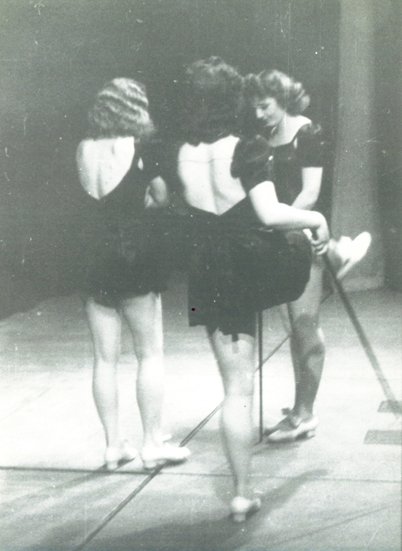 Yvonne inspecting the gaps in the staging
Yvonne inspecting the gaps in the stagingThe story behind the picture is the German national anthem was being played and we were so nonchalant about it because we were checking out the big gaps in the stage and hoping that non of us would have a problem with the canes that we used in that number. I am the one that is on the right and looking down at the cracks.
To be continued.
-
AuthorPosts
- You must be logged in to reply to this topic.

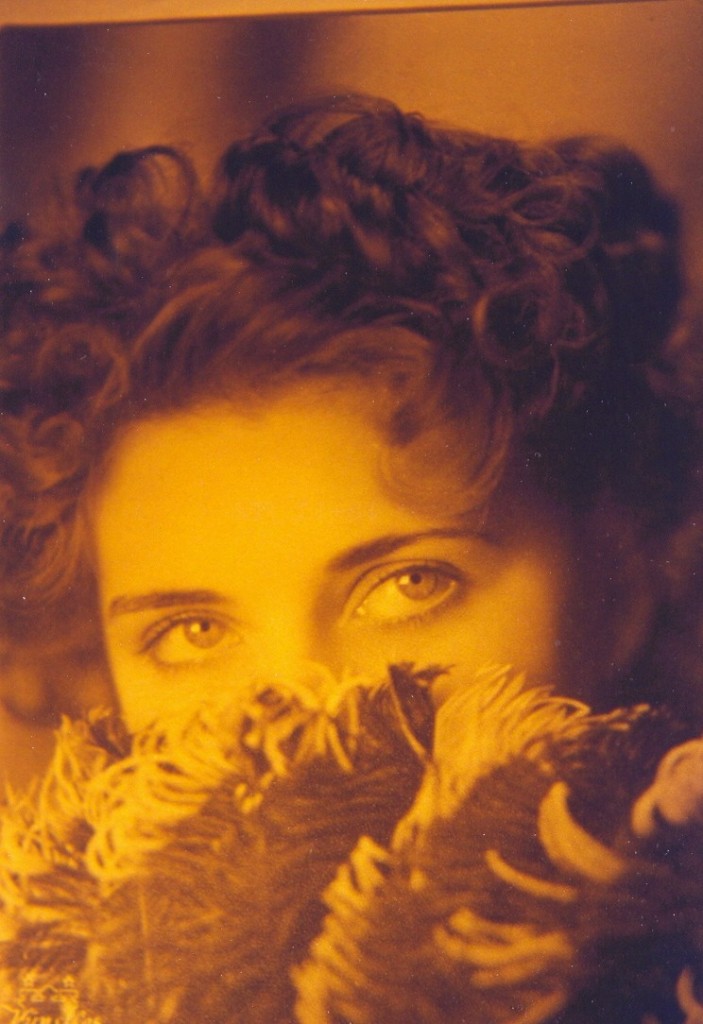 Yvonne Sellers nee Woodroffe
Yvonne Sellers nee Woodroffe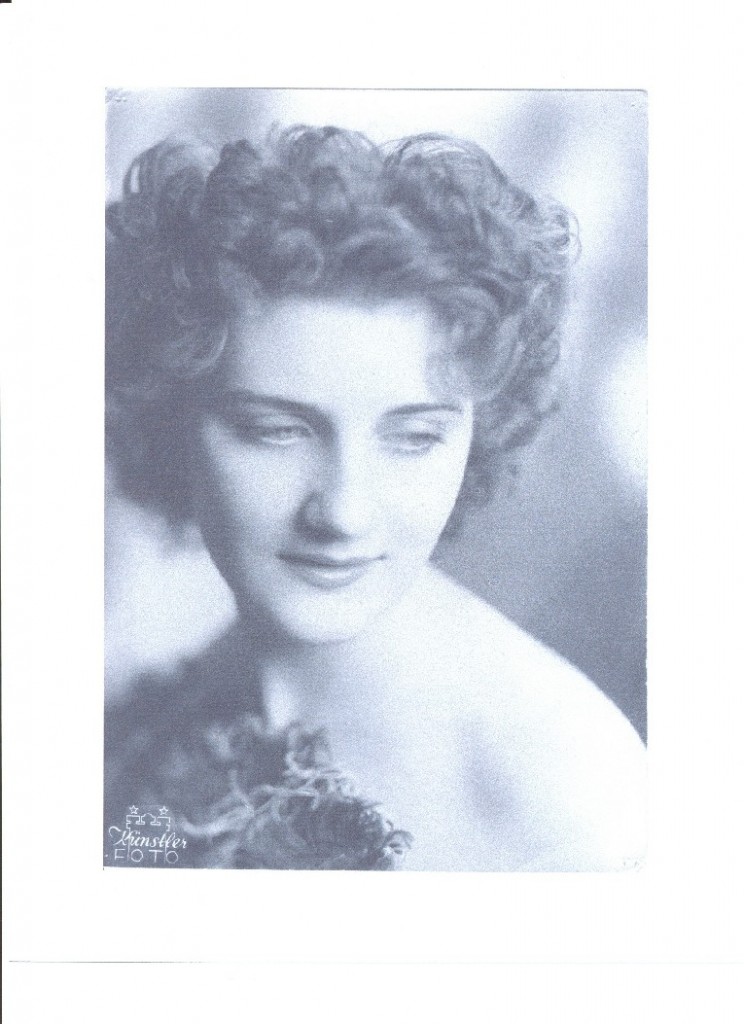 Yvonne
Yvonne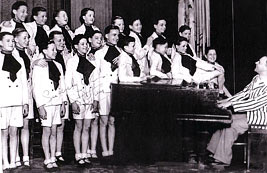 Steffani’s Silver Songsters
Steffani’s Silver Songsters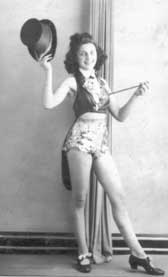
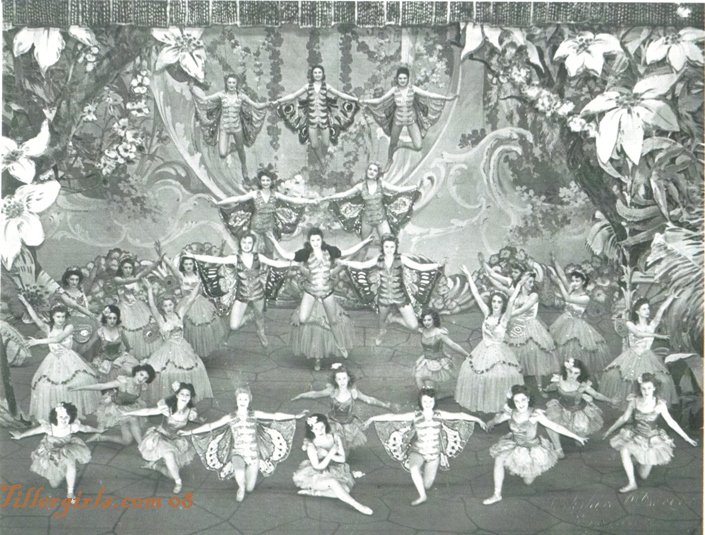
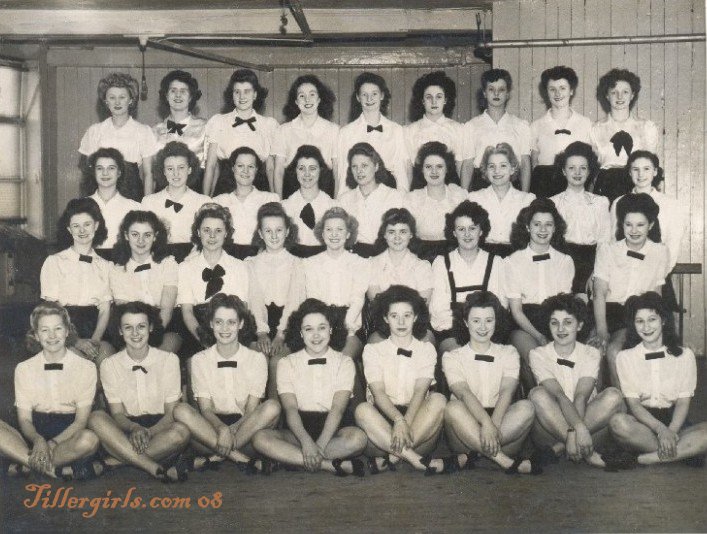 The pictures that I am sending of the black and white ”get” up are what were usually taken on the first day of rehearsal
The pictures that I am sending of the black and white ”get” up are what were usually taken on the first day of rehearsal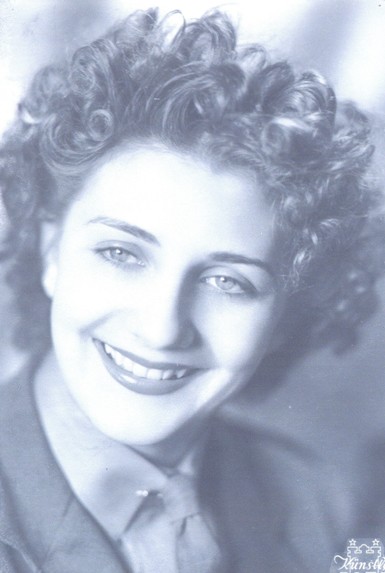
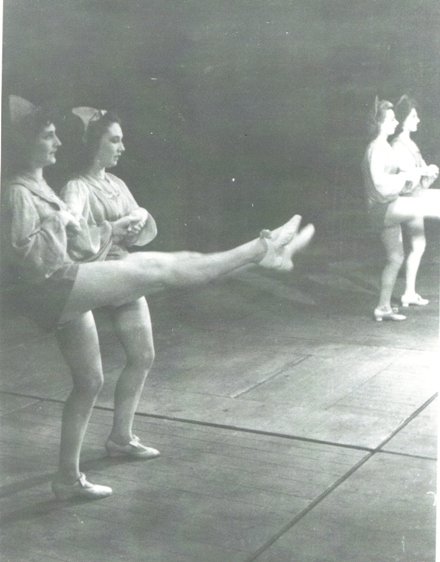 The girls on the same stage
The girls on the same stage
Recent Comments